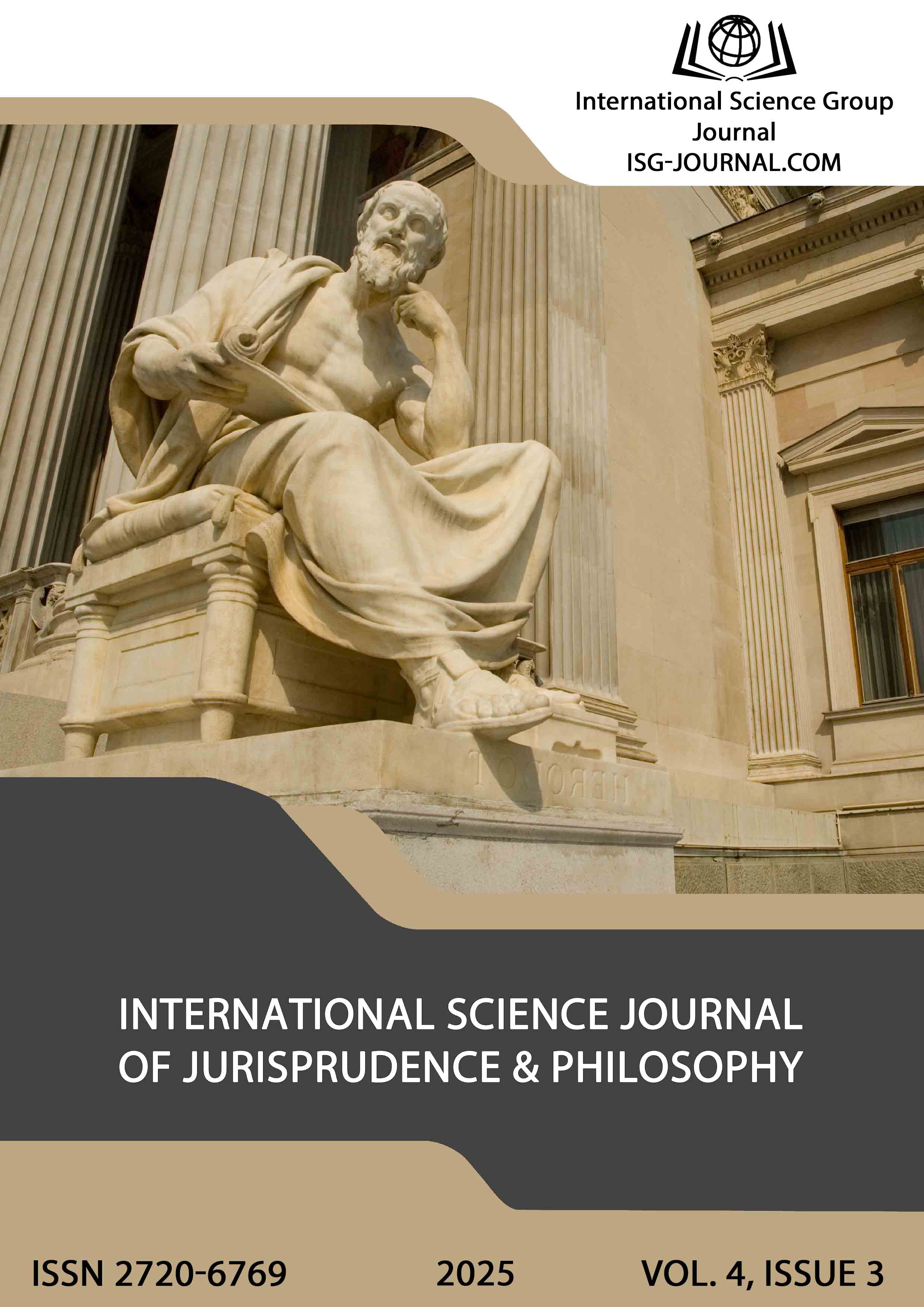The phenomenon of communication in modern socio-humanitarian discourse
DOI:
https://doi.org/10.46299/j.isjjp.20250403.04Keywords:
society, communication, person, information, paradigmAbstract
The communicative turn in culture, which was reflected in philosophical concepts and scientific theories of the 20th century, testifies to the new circumstances of modern human life, to the emergence of new problems in the sphere of communicative coexistence of people. The article considers the phenomenon of communication in modern socio-humanitarian discourse. The methodological role of philosophy in modern scientific explorations of the problem field of communication is indicated. The key paradigms (social-institutional, existential-phenomenological, informational-instrumental) and their heuristic potential in relation to the problem of communication under study are analyzed. These paradigms are not the only and final ones, but their framework character should be noted. The concept of communication is analyzed, its polysemanticity and contextuality are revealed, and it is also found that the definition of the term "communication" has not yet become stable. The article considers / highlights the issue of the correlation of the concepts of communication and socialization, outlines their substantive features. It is noted that they can serve as a conceptual tool for philosophical and scientific reflection, for various concepts, theories in accordance with the goals and objectives of the study. The article highlights the prospect of understanding the issues of communication and communication, given that human existence is characterized by a constant desire to fulfill oneself, to self-realize. Through the prism of communication, a person acquires his own image, asserts himself in the world, being in continuous dialogue with both other subjects and himself. It is noted that not only does a person create a communicative space, but communication also changes a person. However, these changes are ambivalent in nature, since new opportunities and new risks open up for a person and his lifeworld.References
Єрмоленко А.Етика дискурсу Карла-Отто Апеля як «перша філософія» третьої парадигми. Філософська думка.2022. № 2. С.23-38.
Ільганаєва В. О. Соціальна комунікація як об‘єкт теоретизації. Філософія людського спілкування: філософія, психологія, соціальна комунікація. 2009. № 1. C. 60 – 67.
Почепцов Г. Г. Теория коммуникации. Киев: Ваклер, 2001. 656 с.
Плахтій М. П., Сулятицька Т.В. Комунікативна природа людського буття. URL:http://apfs.nuoua.od.ua/archive/37_2022/15.pdf
Берегова О.М. Культура та комунікація: дискурси культуротворення в Україні в XXI столітті : монографія. Київ : Інститут культурології АМУ, 2009. 184 с. URL: https://cutt.ly/XXMbNsu.
Єрмоленко А. М. Комунікативна практична філософія: підручник. Київ : Лібра, 1999. 488 с
Козлов В.М. «Комунікативна модель» суспільства Нікласа Лумана як методологія дослідження релігії. Вісник Черкаського університету. Серія «Філософія».2015. № 11. С. 37-42. https://journals.indexcopernicus.com/api/file/viewByFileId/567902.pdf
Різун В. В. Начерки до методології досліджень соціальних комунікацій. Світ соціальних комунікацій. 2011. Т.1. С. 7–11.
Прищак М. Д. Комунікація, спілкування, комунікативність : категоріальний аналіз. Вісник Вінницького політехнічного інституту. 2010. № 2. С. 5- 8.
Словник паронімів української мови / [уклад. Д. Г. Гринчишин, О. А. Сербенська]. Київ: Освіта, 2008. 320 с.
Самойленко Олена. До питання використання означень «комунікативний» та «комунікаційний» у науковому дискурсі. Вісник Львівського університету. Серія журн. 2013. Вип. 38. С. 353–358. URL:http://publications.lnu.edu.ua/bulletins/index.php/journalism/article/viewFile/5391/5401
Габермас Ю. Інший шлях із філософії суб’єкта: альтернатива комунікативного та суб’єктоцентрованого розуму / У кн.: Хабермас Ю. Філософський дискурс модерну. Київ : Четверта хвиля, 2001. С. 287–319.
Гавра Д. П. Статус теорії комунікації у сучасній системі соціального знання. Світ соціальних комунікацій. 2013. Т.10. С. 9–13.
Іванов В. Комунікаційний світогляд Нікласа Лумана. Луман Ніклас. Реальність мас-медіа / за ред. Іванова В. та Мінакова М. Київ: ЦВП, 2010. С.4-11. URL :https://www.aup.com.ua/uploads/luman_web.pdf
Малахов В. А. Етика спілкування: навч. посібник. Київ: Либідь, 2006. 400 с.
Тишевська-Шапошник О. Теоретичні основи сучасного соціально-комунікативного знання. Вісник Книжкової палати. 2012. № 9. С. 28–31.
Downloads
Published
How to Cite
Issue
Section
License
Copyright (c) 2025 Tetiana Kurylenko

This work is licensed under a Creative Commons Attribution 4.0 International License.

